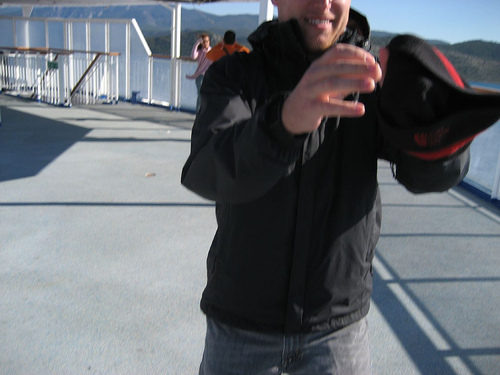
The Edge has published its 2006 edition of its annual question. They've been doing it for a number of years now. I found last year's question to be particularly fascinating - "What do you believe is true even though you can not prove it?"
I've started reading through this year's question, "What is your dangerous idea?" And, conveniently, its given me a theme for Wednesdays, at least for the short term. Wednesdays are now response day. I'm going to try to take something I've read somewhere else and offer some reasonable editorial. Or unreasonable. Either way. What follows are my opinions on the first page of 12 full pages of the 120-some responses to the Edge's 2006 question.
I've decided to pick a few of these as must-reads, which I'm going to try to limit to 2 out of every 10 or so, and they're clearly marked. You will, however, have to click on the question above and scroll down to find the author / submission in question (on the first page, in particular, you need to scroll about halfway down to get past all the news blurbs). Enjoy.
HOWARD GARDNER
Psychologist, Harvard University; Author, Changing Minds
Following Sisyphus, not Pandora
Interesting - I liked the Albert Camus paraphrase: "...in his portrayal of another mythic figure endlessly attempting to push a rock up a hill: one should imagine Sisyphus happy."
MARTIN E.P. SELIGMAN
Psychologist, University of Pennsylvania, Author, Authentic Happiness
Relativism
MUST READ. Finally someone realizes that maybe relativism might just be a bad idea. "But it might and it is just possible that the great minds of the twenty-first century will absolutize the relative."
DAN SPERBER
Social and cognitive scientist, CNRS, Paris; author, Explaining Culture
Culture is natural
Um, yeah. And? Raised one good point (but didn't really do much else): "Dangerous ideas are potentially important. Braving insults and misrepresentations in defending these ideas is noble."
PIET HUT
Professor of Astrophysics, Institute for Advanced Study, Princeton
A radical reevaluation of the character of time
As one who loves debating the existence of time, I had a hard time not labeling this a "must read." It just didn't have enough infrastructure to support the fascinating base that it definitely has. Still, this is fascinating: "What if a future scientific understanding of time would show all previous pictures to be wrong, and demonstrate that past and future and even the present do not exist? That stories woven around our individual personal history and future are all just wrong? Now that would be a dangerous idea."
JOHN GOTTMAN
Psychologist; Founder of Gottman Institute; Author, The Mathematics of Marriage.
Emotional intelligence
Points for brevity.
RICHARD FOREMAN
Founder & Director, Ontological-Hysteric Theater
Radicalized relativity
And we're right back to the uber-intellectual that can't see the forest for the trees when it comes to relativism. That didn't take too long now, did it? I mean, honestly: "the most dangerous idea (and the one under who's influence I have operated throughout my artistic life) is the complete relativity of all positions and styles of procedure. The notion that there are no "absolutes"..."
Is he the only one who can't see that he just created an absolute in his own statement?
PHILIP ZIMBARDO
Professor Emeritus of Psychology at Stanford University; Author: Shyness
The banality of evil is matched by the banality of heroism
Relatively interesting (hah, get the joke?). Helps to have a basic understanding of human depravity to interpret this one.
Absolutely did not agree with this: "The heroic action of Rosa Parks in a Southern bus, of Joe Darby in exposing the Abu Ghraib tortures, of NYC firefighters at the World Trade Center's disaster are acts of bravery at that time and place." Those firefighters were heroes when they went to bed the night before 9/11, every bit as much as when they went up the stairs the next morning. Firefighters all over the region were racing towards that disaster, I heard no tell of even one who cringed away.
JAMES O'DONNELL
Classicist; Cultural Historian; Provost, Georgetown University; Author, Avatars of the Word
Marx was right: the "state" will evaporate and cease to have useful meaning as a form of human organization
MUST READ. Fascinating to think about. Right on some points but hardly seems plausible as a complete idea.
JOHN ALLEN PAULOS
Professor of Mathematics, Temple University, Philadelphia; Author, A Mathematician Plays the Stock Market
The self is a conceptual chimera
Brief argument for Buddhism. "(Or so this assemblage of beliefs, perceptions, and attitudes sometimes thinks.)"
CLIFFORD PICKOVER
Author, Sex, Drugs, Einstein, and Elves
We are all virtual
Not quite a must read but fascinating. I'm still trying to figure out what he meant by the last paragraph, but for the most part I agree with the concept - this could (and probably will, in some form) happen. But we need to be aware of the dangers of it. Sounds like it could easily turn into something straight out of a movie.















No comments:
Post a Comment